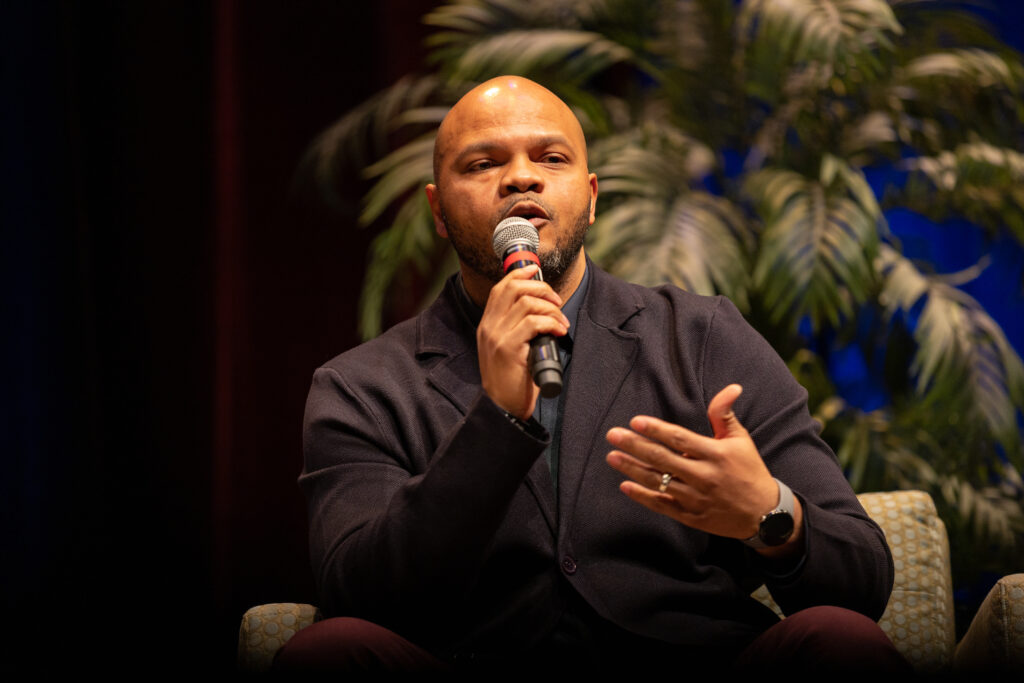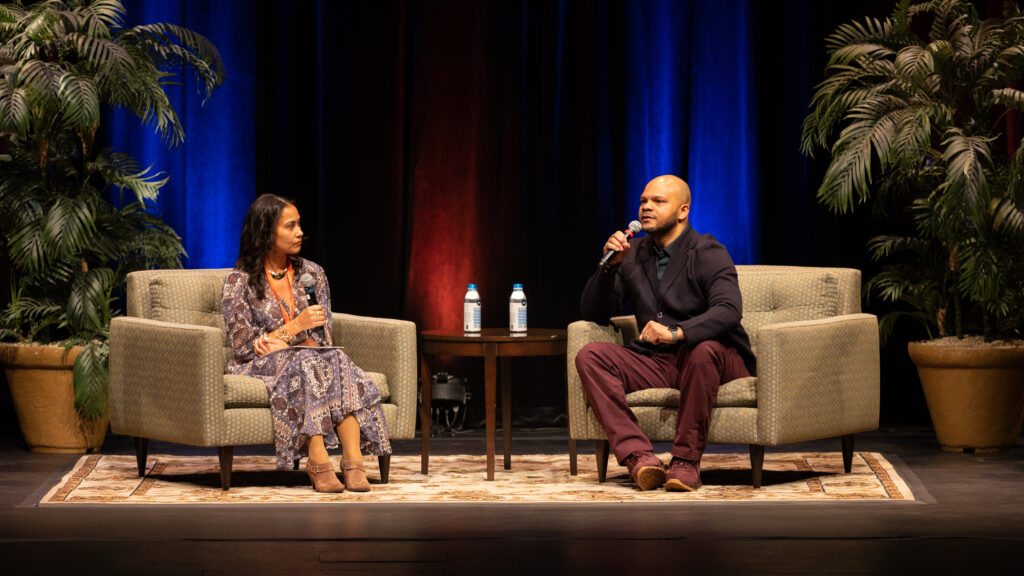Central Park Five Member Speaks at Screening of Ken Burns Film
By Katie Oglesby, Editor-in-Chief

Member of the exonerated Central Park Five Kevin Richardson talks at the Ken Burns Film Festival on Saturday, Feb. 11, 2023 (Photo Eric Lippe/The Gettysburgian)
The second day of the Ken Burns Film Festival at the Majestic Theater ended with a screening of Ken Burns’s film “The Central Park Five” and a discussion with one of the exonerated members of the Central Park Five, Kevin Richardson, afterward.
Saturday’s event began with Majestic Theater founding executive director Jeffrey Gabel giving opening remarks.
He described the documentary by saying it “follows a horrific crime and a horrific miscarriage of justice against children.”
He said, “[The film shows] the power that documentary film can have.” He proceeded to connect the Central Park Five with current events in Tennessee where Tyre Nichols was killed by Memphis police officers.
The film details the events that happened in New York City in 1989 where five Black and Latino teenagers were wrongly accused and convicted of the rape of a white woman. It wasn’t until the early 2000s that they were exonerated and the real rapist was found.
After the film screening, Richardson sat down for discussion with Alisha Sanders, a local educator. Sanders began by noting that both she and Richardson were 14 years-old in 1989, and both have 14 year-old children now.

Member of the exonerated Central Park Five Kevin Richardson talks to local educator Alisha Sanders at the Ken Burns Film Festival on Saturday, Feb. 11, 2023 (Photo Eric Lippe/The Gettysburgian)
Sanders asked him whether he was aware of the racial tension and division in New York City at the time, and what he understood about these race relations at 14.
Richardson explained that he witnessed it firsthand, but that it was different to experience it.
When asked whether he feared “the system,” Richardson said he knew of the issues related to justice, but, he said, “That night, I wasn’t afraid of being arrested…I was afraid of breaking my curfew.”
His mom grew up in the Jim Crow South. Sanders asked whether she ever expressed concern over him losing his life in the justice system.
Richardson said that she grew up with fear of the Klu Klux Klan and carried the fear of her son never returning home, a fear that he still carries for his own children. He later spoke on whether he wanted to protect his children from stories about racial injustices.
“I did shelter my 14 year-old,” he said, “because I was afraid that she might not come back home.”
Though, he said he did have the “talk” with her, and his five year-old daughter knows what happened from seeing him on the TV.
“When she sees that I got hurt by police, she starts to cry,” he said.
Sanders asked whether he was aware of the growing public opinion and case when it was happening in 1989. Richardson said, “I didn’t really understand until…I came out the last precinct and there was paparazzi.” He said he saw pictures of himself in the news, though that was one of the many legal violations that occurred at the time.
Sanders asked about the “scars” of having his youth taken from him, and he noted that he survived a system that wanted him dead.
Richardson said, “People might see the finished product of what I’m doing now, but to go through this and come back alive, I can’t take that for granted.”
He emphasized his experience as a sacrifice for the next generation, and that there is still a long way to go to fix what he called a “broken system.”
He reflected on the experience of filming the documentary saying, “It was Ken Burns that gave us our voice back” and said that sharing his story was a therapeutic experience.
Sanders asked him what he wants his lasting legacy to be, and he started by saying, “[It’s] pretty cool to even be speaking about legacies.”
He added that he wants to inspire individuals to make change, even if they aren’t activists.
“You don’t have to be an activist to be active,” he said, adding that people can go through their local political offices, and suggesting people sit down to have more conversations like this.
He ended on the final thought that he wanted to show his appreciation for Ken Burns, his daughter Sarah Burns, and her husband David McMahon, who collaborated on the film. He said Sarah Burns was the first person to actually help the five of them, and she had served as an intern for one of his attorneys before writing the book about the Central Park Five.
This article was edited at 7:08 p.m. on Monday, Feb. 13, 2023 to correct an error that said Tyre Nichols was killed by police in Florida. He was killed in Tennessee (- K. Oglesby).
